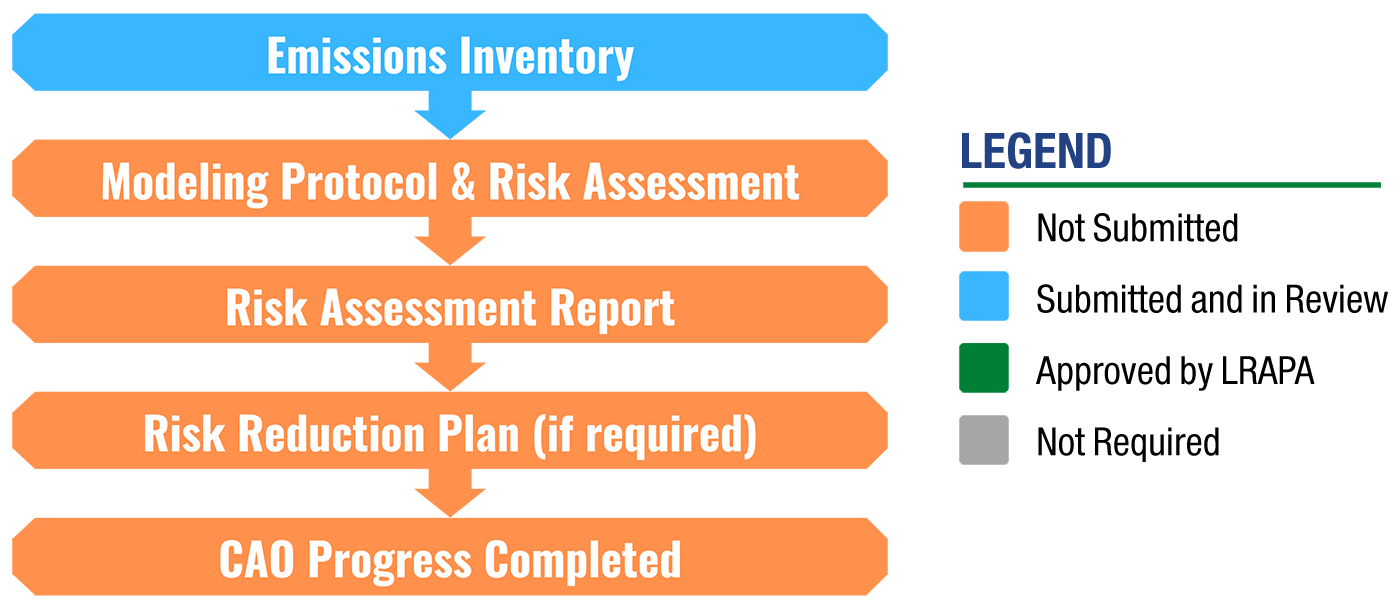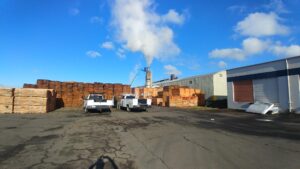Emerald Forest Products, Inc. Plant #1
Cleaner Air Oregon ProfileEmerald Forest Products, Inc. Plant #1
Cleaner Air Oregon (CAO) is a health-based permitting program that regulates emissions of toxic air contaminants from facilities based on risk to nearby communities. CAO requires facilities to report toxic air contaminant emissions, assess potential health risks to people nearby and reduce toxic air contaminant risk if it exceeds legal limits.
As part of the Cleaner Air Oregon process, each facility has a dedicated web page to provide communities access to facility information and updates on where it is involved in the process.
- Each step of the CAO risk assessment process has a section that includes LRAPA’s communications and deliverables from the facility.
- A color-coded graphic shows where a facility is in the Cleaner Air Oregon Process.
- For additional information and history of the program, visit the DEQ Cleaner Air Oregon website.
| Document Type | Anticipated Submittal Date | Approval Date |
|---|---|---|
| Emissions Inventory | 04/15/2022 | TBD |
| Modeling Protocol | TBD | TBD |
| Risk Assessment Report | TBD | TBD |
| Risk Reduction Plan | TBD - if needed | TBD - if needed |
| CAO Completed | TBD | TBD |

Emissions Inventory
For an introduction to emissions inventories and why they matter, please see EPA’s Fact Sheet. A facility-specific emissions inventory timeline and associated documents are linked below.
December 15, 2021: LRAPA calls Emerald Forest Products, Inc. #1 into the program
- LRAPA’s call in letter to EFP#1.
March 4, 2022: Emerald Forest Products, Inc. #1 requests an extension to submit their CAO Emission Inventory.
- EFP#1’s extension request letter.
March 7, 2022: LRAPA approves EFP#1 Emission Inventory extension request with a new deadline of April 15, 2022.
- LRAPA’s extension request approval letter.
April 15, 2022: EFP#1 submits their CAO Emission Inventory by the deadline of April 15,2022.
- EFP#1’s CAO Emission Inventory.
Modeling Protocol & Risk Assessment
This section will be updated when the facility submits a modeling protocol and risk assessment work plan for approval and then completes a risk assessment. The risk assessment calculates the risk posed to the community by the facility’s air emissions.
Risk Assessment Report
This section will be updated when the facility submits a risk assessment report presenting the results of modeling and calculating health risks from the facility. The risk assessment report undergoes public review.
Risk Reduction Plan
If modeling shows elevated risks, this section will be updated when the facility submits a plan to install pollution controls or take other actions to reduce risks below Cleaner Air Oregon benchmarks. The risk reduction plan undergoes public review.
CAO Progress Completed
This section will be updated when the facility completes all Cleaner Air Oregon requirements, including required emissions reductions and permitting actions. The facility’s updated permit will ensure ongoing compliance.
FACILITY
EFP#1 operates a veneer-drying and plywood production facility located at 118 Highway 99 North, Eugene, Oregon. The facility began operation in 1953. EFP #1 operates two veneer dryers, five plywood presses, a natural gas-fired boiler (~43 MMBtu/hr Max capacity) with diesel fuel backup, and a variety of saws and wood-processing equipment. The facility is permitted to produce a maximum of 350,400,000 ft2 of plywood on a 3/8” basis per year. Learn more about LRAPA’s regulation of EFP #1 by viewing their current air permit documents below.
Site Address
118 Highway 99 N.
Eugene, Oregon, 97402
Current Air Permit
Permit type: Standard ACPD
Source Number: 202528
LRAPA Contact
Max Hueftle
541-736-1056, ext. 231
Site Address
118 Highway 99 N.
Eugene, Oregon, 97402
Current Air Permit
Permit type: Standard ACPD
Source Number: 202528
LRAPA Contact
Max Hueftle
541-736-1056, ext. 231

Legend
Facility
EFP#1 operates a veneer-drying and plywood production facility located at 118 Highway 99 North, Eugene, Oregon. The facility began operation in 1953. EFP #1 operates two veneer dryers, five plywood presses, a natural gas-fired boiler (~43 MMBtu/hr Max capacity) with diesel fuel backup, and a variety of saws and wood-processing equipment. The facility is permitted to produce a maximum of 350,400,000 ft2 of plywood on a 3/8” basis per year. Learn more about LRAPA’s regulation of EFP #1 by viewing their current air permit documents below.

Emissions Inventory
For an introduction to emissions inventories and why they matter, please see EPA’s Fact Sheet. A facility-specific emissions inventory timeline and associated documents are linked below.
December 15, 2021: LRAPA calls Emerald Forest Products, Inc. #1 into the program
- LRAPA’s call in letter to EFP#1.
March 4, 2022: Emerald Forest Products, Inc. #1 requests an extension to submit their CAO Emission Inventory.
- EFP#1’s extension request letter.
March 7, 2022: LRAPA approves EFP#1 Emission Inventory extension request with a new deadline of April 15, 2022.
- LRAPA’s extension request approval letter.
April 15, 2022: EFP#1 submits their CAO Emission Inventory by the deadline of April 15,2022.
- EFP#1’s CAO Emission Inventory.
Modeling Protocol & Risk Assessment
Emerald Forest Products, Inc. Plant #1 is currently in the Emissions Inventory Step of the Cleaner Air Oregon process. This field will be updated once the facility reaches the Modeling Protocol & Risk Assessment portion of CAO.
Risk Assessment Report
Emerald Forest Products, Inc. Plant #1 is currently in the Emissions Inventory Step of the Cleaner Air Oregon process. This field will be updated once the facility reaches the Modeling Protocol & Risk Assessment portion of CAO.
Risk Reduction Plan
Emerald Forest Products, Inc. Plant #1 is currently in the Emissions Inventory Step of the Cleaner Air Oregon process. This field will be updated once the facility reaches the Modeling Protocol & Risk Assessment portion of CAO.
CAO Progress Completed
Emerald Forest Products, Inc. Plant #1 is currently in the Emissions Inventory Step of the Cleaner Air Oregon process. This field will be updated once the facility reaches the Modeling Protocol & Risk Assessment portion of CAO.

